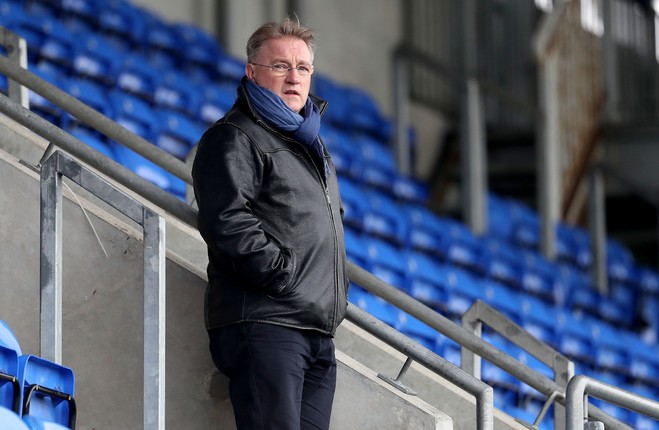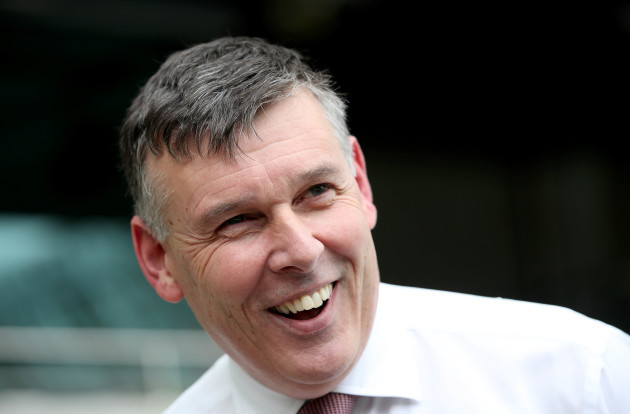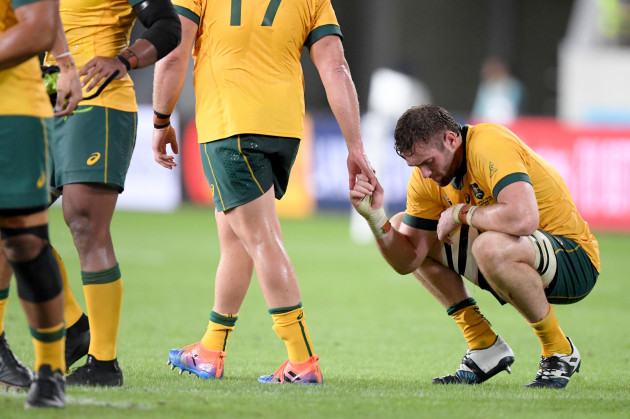LAST UPDATE | 25 May 2020
EDDIE O’SULLIVAN SAYS rugby’s top earners are going to have to accept salary cuts if the game is to survive.
The arrival of a global pandemic has led to a shutdown in the sport, depriving clubs and unions of the income they need from match-day revenues. Accordingly, Ireland’s leading players had already agreed to pay deferrals before IRFU chief executive, Philip Browne, went on record last week to say the union were ‘spending tomorrow’s money today in order to keep afloat’.
Now O’Sullivan, who was Ireland’s head coach from 2001 until 2008, winning three triple crowns, has added his voice to the discussion, saying financial reality is going to have to kick in for players pretty soon.
“I know Philip Browne was playing the poor-mouth last week but despite this, Irish rugby fans shouldn’t be overly worried because to be fair, the union is pretty well run,” O’Sullivan said. “The IRFU have several assets to their name and while cash-flow problems could arise if they are unable to play fixtures, the fact remains they are one of the wealthiest unions in the world.
I’d even go as far as to say that if there is one union I’d back my house on to survive this crisis, it’s the IRFU. I know Philip Browne was saying they have money ring-fenced for the amateur game. Well just take the fence away. This is a crisis. If you need that ring-fenced money to keep the show on the road, then use it.”
Even if the IRFU were to do so, until the gates are re-opened for international matches, rugby chiefs will be in a sweat. Browne acknowledged as much last week, saying rugby may soon need ‘a pretty severe market adjustment around the world’. In other words, unless matches are rescheduled sometime soon, contracts may have to be renegotiated.
O’Sullivan adds: “The market has to readjust. Basic economics tell you that you can only pay players whatever you have. If it isn’t viable to continue to pay players big salaries then you simply have to renegotiate contracts. Cuts, if they have to be imposed, should be delivered on a sliding scale, say 20 per cent reductions for the higher earners, 10 per cent for the lower ones.
If players object to pay cuts, it won’t be a good look. Rugby players are known for their commitment to the jersey, it’s something they continually trade on. But if they refuse to take a pay cut then they’ll lose credibility. The fact remains they are paid multiples of the average industrial wage. Even if they feel it is unfair, sometimes you have to take one for the team.”
Three Queensland Reds players felt a degree of injustice last week when they opted to terminate their contracts after a prolonged and bitter pay dispute ended with them being offered a deal which involved a 60 per cent pay cut over six months.
It’s an issue O’Sullivan has watched from afar and having lived through periods where giants of the game have fallen, he is predicting a sporting recession in Australian rugby to follow the economic one.
“I’d hate to be a Wallabies fan right now because they are a financial basket-case compared to Ireland,” O’Sullivan said. “The figures they’ve released this year are frightening. I’m not saying they’ll disappear off the map as a team but they could be staring into a decade like the one France are just coming out of. Rather than continuing to be one of the world’s traditionally strong sides, their form could just dip alarmingly.
“This sort of thing has happened before. Wales in the ‘80s were a hell of a lot different to Wales in the ‘70s. More recently, France fell apart after the 2011 World Cup. The same thing happened to Biarritz in club rugby, to Leeds United in soccer. Sport is a meritocracy. No one is given a pass. If you are in trouble, it can take years to get out of it. Australia could end up being the eighth or ninth best side in the world for a decade or so.”
Other casualties may follow. Looking at club rugby’s financial model, O’Sullivan grimaces.
“It isn’t working for most (clubs),” he says. “For far too many club owners, running a rugby club is a vanity project. Unlike America, in this part of the world, sport struggles to make a profit and rugby is very much of that ilk. There’s the old adage, you’ll only make a small fortune in rugby if you start off with a big one. Strict salary caps are the way forward but are impossible to enforce across rugby’s global market.
“Rugby’s financial model, worldwide, has been a catastrophe but Ireland are actually better placed than most to survive this crisis.”
As a pandemic brings the game to a point it has never been before, the arrival of a venture capitalist group, CVC, has ignited a new debate. The game’s traditionalists don’t want them near the sport but those running Pro14 and Premiership Rugby have accepted CVC’s offers, with Pro14 announcing last week that the investment company had taken up a 28% share of the company running Pro14 Rugby, paying a reported €140m for the privilege.
“There is a big risk with CVC,” O’Sullivan says, “and the big danger is that the money they invest in the game will only end up going on player salaries. I could be wrong and hope I am proven to be incorrect on this but I just can’t see how a venture capitalist’s investment will increase the probability of us seeing every kid on the village green running around with a rugby ball.
“Maybe they will do a brilliant job. I just see it as a risk to let them in the door. Down the line, what happens if they gain control of the product? I know the unions are saying now this won’t happen but what if things change in four-years-time and rugby needs more money? That’s when I will worry. We can’t ever allow ourselves to be in a position where an outside body gains control of the game.”
First published today at 18.54



